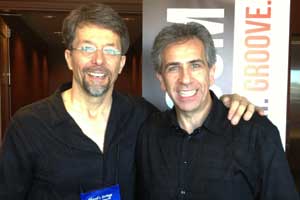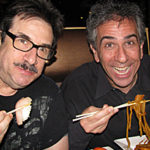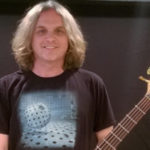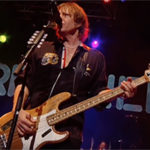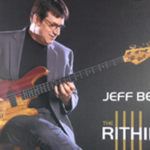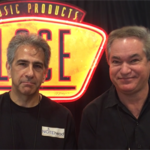Classical virtuoso talks about life as a solo bassist, studying with Gary Karr, thoughts on jazz and electric bass and the Bradetich Foundation
Exclusive interview with FBPO’s Jon Liebman
October 3, 2011
Proclaimed by the New York Times as “the master of his instrument,” Jeff Bradetich is regarded as one of the leading performers and teachers of the double bass in the U.S. today. Since his New York debut in Carnegie Recital Hall in 1982, he has performed more than five hundred concerts on four continents and has won numerous solo competitions.
Jeff served as executive director of the International Society of Bassists for eight years, where he established the ISB conventions, solo competitions, endowment fund and the ISB magazine. He has taught on the faculties of the Interlochen Arts Academy, University of Michigan and Northwestern University and has been the head of the largest (upright) bass program in the world at the University of North Texas since 1994. He has also been visiting professor at the Cleveland Institute of Music and Northwestern University.
Jeff Bradetich has recorded six solo albums for double bass and piano. His new book, Double Bass: The Ultimate Challenge, was released in 2009. Most recently, Jeff established the Bradetich Foundation with the purpose of advancing the performing, teaching and knowledge of the double bass.
FBPO: Tell me about your musical upbringing. How did you become a bass player?
JB: Both my mother and grandmother were vocal soloists in their churches, so I heard lots of singing when I was young and this had a strong influence on my playing style. I started playing the bass when I was 10 in the school music program in Eugene, Oregon. I like to cite two reasons for choosing the bass: For one, it was free! You had to pay to rent the other string instruments. Also, when the string teacher came to our school to recruit new players, absolutely no one wanted to play a string instrument. I felt really sorry for him so I volunteered. I really wanted to be a rock drummer, but that didn’t work out.
FBPO: Who were your influences as a young, up-and-coming bass player?
JB: My most important teacher and mentor through high school was Dr. Robert Hladky, the cello professor at the University of Oregon. He had some bass training with Oscar Zimmerman, but he taught me many advanced techniques in both the right and left hand from the cello that were basically unknown on the bass at that time (early 1970s). He also took me through much cello literature that pushed me well beyond the demands of the bass repertoire. Perhaps the most important aspect of his teaching was that he expected as much of me as a bass player as he did of any of his top cellists, not allowing anyone to make excuses because they happened to play bass.
Other major influences on my early training include having the opportunity to work with Helmuth Rilling, one of the great Bach musicians of our time. I began playing in his Bach orchestras in eighth grade and worked with him for ten summers. Also, my summer study with Gary Karr and having the opportunity to hear and see him perform many times was another big influence. Once in college, studying the orchestra material with one of the top orchestral bass teachers, Warren Benfield, was a key component to learning and subsequent teaching. He didn’t know pedagogy or solo repertoire, but could solfege every note of every orchestral passage.
FBPO: Was your goal to perform in a major symphony orchestra, or did you always want to be a soloist?
JB: After my freshman year at Northwestern at age 19, I won the job with the Lyric Opera of Chicago Orchestra. This was a fabulous experience, as opera playing is very demanding and I had the opportunity to hear the greatest singers in the world everyday. I tried to emulate their natural singing style in my own playing and found that the bass can indeed be a profound lyrical expressive instrument. From there, I began my teaching career at the University of Michigan. This allowed me to pursue solo performance more readily and to have an impact on the future of bass playing through teaching. At that time, there were many fine orchestral players, but few full-time and fully dedicated bass teachers. I found that this was where my innate talent lay and I had the opportunity to pursue it.
FBPO: How did your career begin to take off? One doesn’t acquire a stature like yours overnight.
JB: The answer to this is the same as pretty much everyone else’s: Lots of hard work, some insightful and dedicated teachers and opportunity that knocked and I answered. I have a bit of a “Go for it” attitude in life and, you know, it is okay to be passionate about what you do. If you don’t love and enjoy what you are doing, how can you expect your audience to?
FBPO: Tell me about your experience studying with Gary Karr.
JB: I learned an enormous amount from Gary in my three-week summer study with him and value it as much as my college education. His concepts of playing, performing, sound production and expression were revolutionary for the bass and every one of my students over the past thirty-two years has benefited from his ideas. Admittedly, I had to pry much of the information out of him, but once the floodgates were opened, I couldn’t take notes fast enough!
FBPO: You’ve done an awful lot of teaching over the years. How do you help your students find that balance between wanting to be great players on the one hand, and needing to make a living on the other?
JB: I think it is fine for a young person to be an idealist and strive to “be the best.” If we only study to get a job, then everyone is being short-changed – the student, his or her peers and parents and the audience. Ultimately, life happens and decisions are made that direct one’s life. Few have the work ethic and talent to reach the highest level of performance, no different than any sport. But there is much opportunity in every aspect of the musical world to make a living, to fulfill one’s talent and to enjoy the beauty of what we do.
FBPO: Have you ever played much jazz? How many Ron Carter, Milt Hinton, Ray Brown and Oscar Pettiford CDs (or records!) do you own?
JB: More LPs than CDs! I have played some jazz, mainly bowed. But I am a product of the classically trained world, where we are not taught, or even allowed to improvise or play by ear. Luckily, this is changing in our educational mentality. I find that almost all of my classical majors have some training and experience in jazz and it only benefits their classical playing. The opposite is true, too, of course.
FBPO: How about the electric bass? Have you ever analyzed what Stanley Clarke, Jaco Pastorius and Victor Wooten have played?
JB: I am leaving the electric bass up to my son, Ryan. But I did perform once with Victor Wooten. Just to set the record straight, I played the top part and he played the bottom part!
FBPO: What about Esperanza Spalding? I mean, given your Oregon roots, how much has she crossed your radar screen?
JB: We all cheered loudly when she won the GRAMMY. I can see her influence already at play with the next generation. She has opened some doors that we will all benefit from in the future. Anyone from Oregon is already a great person, so I would love to talk with her and perform together.
FBPO: Tell me about the Bradetich Foundation and its mission.
JB: I have always been an advocate for the bass through every means at my disposal: playing, teaching, recording, my work with the ISB, organizing bass events, summer courses and writing articles and books. But there is more work to do, so the Foundation was formed three years ago to, in essence, help advance the bass. We are working in two areas primarily. The first is to identify the very best young artists and help develop their careers as solo performers. This happens through our International Solo Competition. The winner of our first competition, in 2010, was Artem Chirkov, the principal bass of the St. Petersburg Philharmonic in Russia. His first prize is valued at more than $30,000, including cash, a CD recording soon to be released, a New York debut recital in Weill Recital Hall at Carnegie Hall on December 10th of this year and numerous performances. The next competition will be in 2014.
The other major aspect of the Foundation is on the educational/grassroots level by sponsoring, organizing and providing scholarships for summer courses for the bass and to establish bass concert programs in the schools to expose young people to the diversity, fun and beauty of the bass. Obviously, funding is very important, but we are making good progress and looking forward to involving as many people as possible.
FBPO: What’s next for your career? What else would you like to accomplish that you haven’t done yet?
JB: I’d like to help establish more performance opportunities for all levels of bass players and to make a few more recordings, instructional DVDs and write at least one more book myself.
FBPO: I bet you didn’t know that you and I stood next to each other while performing in Washington Square Park during the ISB convention in New York in 1990. Are you going to add my name to your resume now, alongside the other luminaries with whom you’ve performed?
JB: I should done it have long ago! That was a fun time, especially when we took the large group of bass players into the subway and played “A-Train” on the A-Train platform. The Milt Hinton birthday bash was also unforgettable with all of the jazz luminaries performing for him.
FBPO: What would you be if you weren’t a bass player?
JB: You mean there is something else in life besides being a bass player? A conductor? Maybe not. I would probably be involved in the teaching profession in some form. Either that or a basketball coach!
